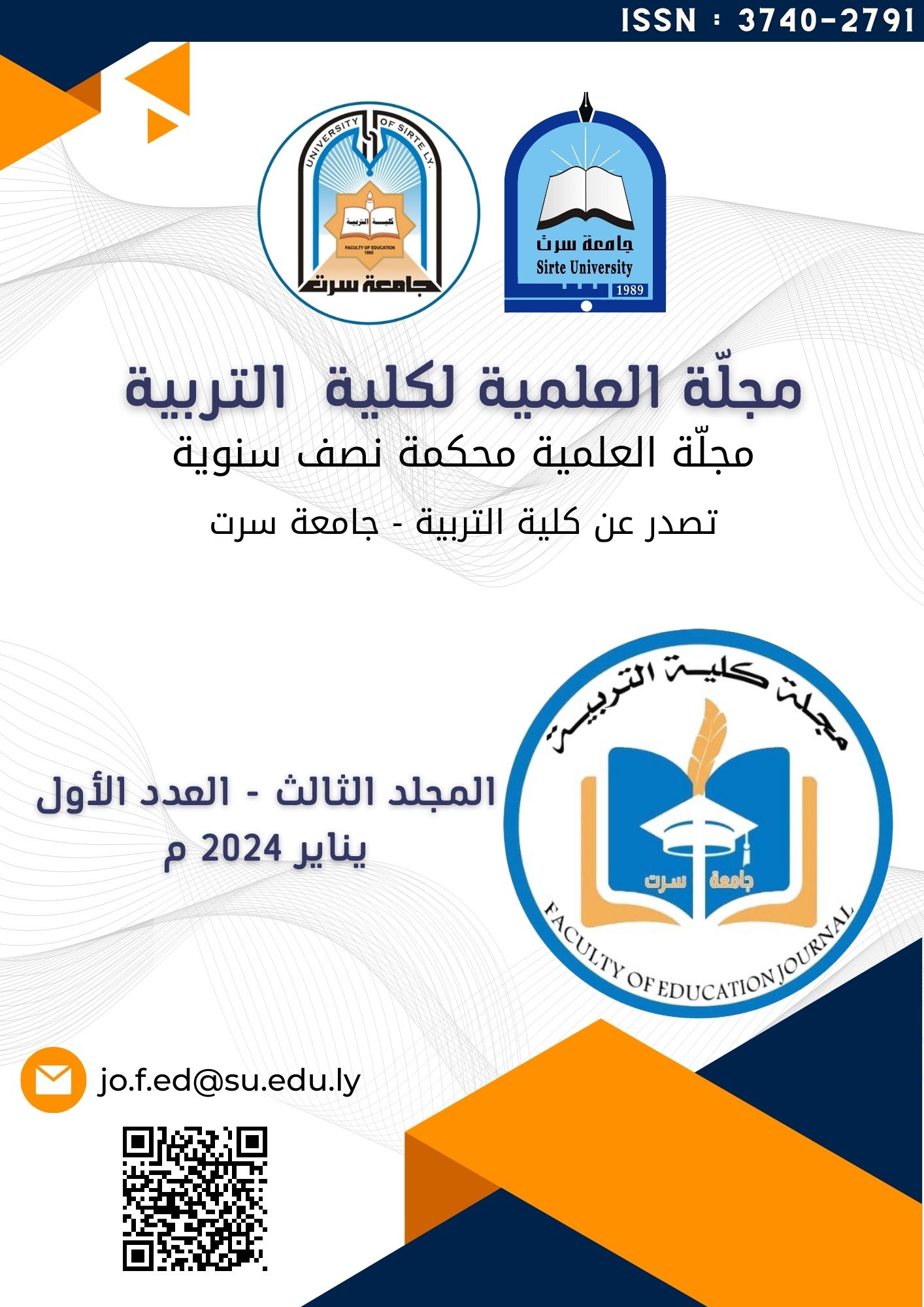التدخل السلوكي لعلاج اضطراب طيف التوحد (ASD) إستراتيجية تحليل السلوك التطبيقي (ABA) أنموذجًا
DOI:
https://doi.org/10.37375/foej.v3i1.2580Keywords:
Behavioral intervention, Applied behavior analysis, Autism spectrum disorderAbstract
Autism spectrum disorder is a complex developmental disability that affects children in their early childhood and is called; (Puzzle disorder) due to its complexity and ambiguity, it is a disability that has a comprehensive impact on all aspects of the child’s mental, social, emotional, motor and sensory development, and the most obvious deficiency aspects of this disability are the communication aspect and mutual social interaction. Applied behavior analysis is a new approach to improving behaviors and developing social skills, as applied behavior analysis comes as one of the best options available to deal with these abnormal behaviors within special abilities schools, in addition to its ability to effectively deal with undesirable behaviors by reducing, erasing, or replacing them with positive behaviors. The current research aims to identify the concept and characteristics of applied behavior analysis as a strategy for treating the autism spectrum, learn the basic steps and principles in applied behavior analysis, and reveal the procedures for forming new behaviors in the autistic child and ways to develop them. The research concluded with a number of results, the most important of which are: Applied behavior analysis is considered one of the behavior modification procedures and is among the effective modern therapeutic strategies for autistic children. It usually targets abnormal behaviors and seeks to change them and replace them with normal ones, and relies directly on objective observation of behavior. Applied behavior analysis procedures are among the successful methods that can be used with autistic children in learning various skills (independence, social, cognitive, perceptual, and motor) as well as solving behavioral problems that appear in the autistic child.
References
_ إبراهيم عبد الله الزريقات (2018): تحليل السلوك التطبيقي مبادئ وإجراءات في تعديل السلوك، عمان: دار الفكر.
_ إبراهيم عبد الله العثمان (2011): بناء وتعديل سلوك الأطفال، عمان: إثراء للنشر والتوزيع.
_ أحمد ظافر محسن، منيرة عمر الشلي (2003): الاضطرابات النفسية للطفولة وعلاجها سلوكيًّا، طرابلس: الـمركز القومي للبحوث والدراسات العلمية.
_ أسماء قاسمي (2017): فاعلية برنامج تحليل السلوك التطبيقي (ABA) في تنمية الإدراك الحسي عند طفل التوحد، رسالة ماجستير غير منشورة، جامعة عبد الحميد بن باديس، كلية العلوم الانسانية والاجتماعية، مستغانم، الجزائر.
_ إيمان جمال الـمصدر (2015): فاعلية برنامج تحليل السلوك التطبيقي في تعديل سلوك أطفال التوحد، رسالة ماجستير غير منشورة، الجامعة الإسلامية غزة، كلية التربية.
_ بندر بن ناصر العتيبي (2012): تحليل السلوك التطبيقي مقدمة لأولياء الأمور والـمعلمين والـمهنيين، الرياض: دار النشر الدولي للنشر والتوزيع.
_ جلال كايد ضمرة، وعريب أبو عميرة، وانتصار خليل عشا (2007): تعديل السلوك، عمان: دار صفاء للنشر والتوزيع.
_ جمال محمد الخطيب (2017): تحليل السلوك التطبيقي، عمان: دار الشروق للنشر والتوزيع.
_ رائد خليل العبادي (2006): التوحد، عمان: مكتبة الـمجتمع العربي للنشر والتوزيع.
_ رغد ممدوح الغامدي، وفايز سليمان معاجيني، (2020): مستوى تطبيق معلمات ذوي اضطراب طيف التوحد لإستراتيجيات تحليل السلوك التطبيقي في مراكز الرعاية النهارية في مدينة جدة، الـمجلة التربوية، العدد الثالث والسبعون، مايو 2020.
_ عادل عبد الله محمد (2008): العلاج بالـموسيقى للأطفال التوحديين أسس وتطبيقات، القاهرة: دار الرشاد للنشر والتوزيع.
_ فان دالين، (1985): مناهج البحث في التربية وعلم النفس. ترجمة: محمد نبيل نوفل، وسليمان الحضري، وطلعت منصور، وسيد عثمان. ط3، القاهرة: مكتبة الأنجلو.
_ فهد بن حمد الـمغلوث (2006): التوحد كيف نفهمه ونتعامل معه، الرياض: مؤسسة الـملك خالد الخيرية.
_ فؤاد أبو حطب، وآمال صادق (2010): علم النفس التربوي، ط6، القاهرة: مكتبة الأنجلو الـمصرية.
_ مصطفى نوري القمش، خليل عبد الرحمن الـمعايطة (2014): سيكولوجية الأطفال ذوي الاحتياجات الخاصة، ط: 6، عمان: دار الـمسيرة للنشر والتوزيع والطباعة.
_ يارا بندر الحربي، وبندر محيا العتيبي، (2021): تقييم تطبيق إستراتيجيات تحليل السلوك التطبيقي في مدارس التعليم العامل طلاب ذوي الإعاقة من وجهة نظر معلميهم، الـمجلة الدولية للعلوم التربوية والنفسية، العدد: 64، الـمجلد: 46.









